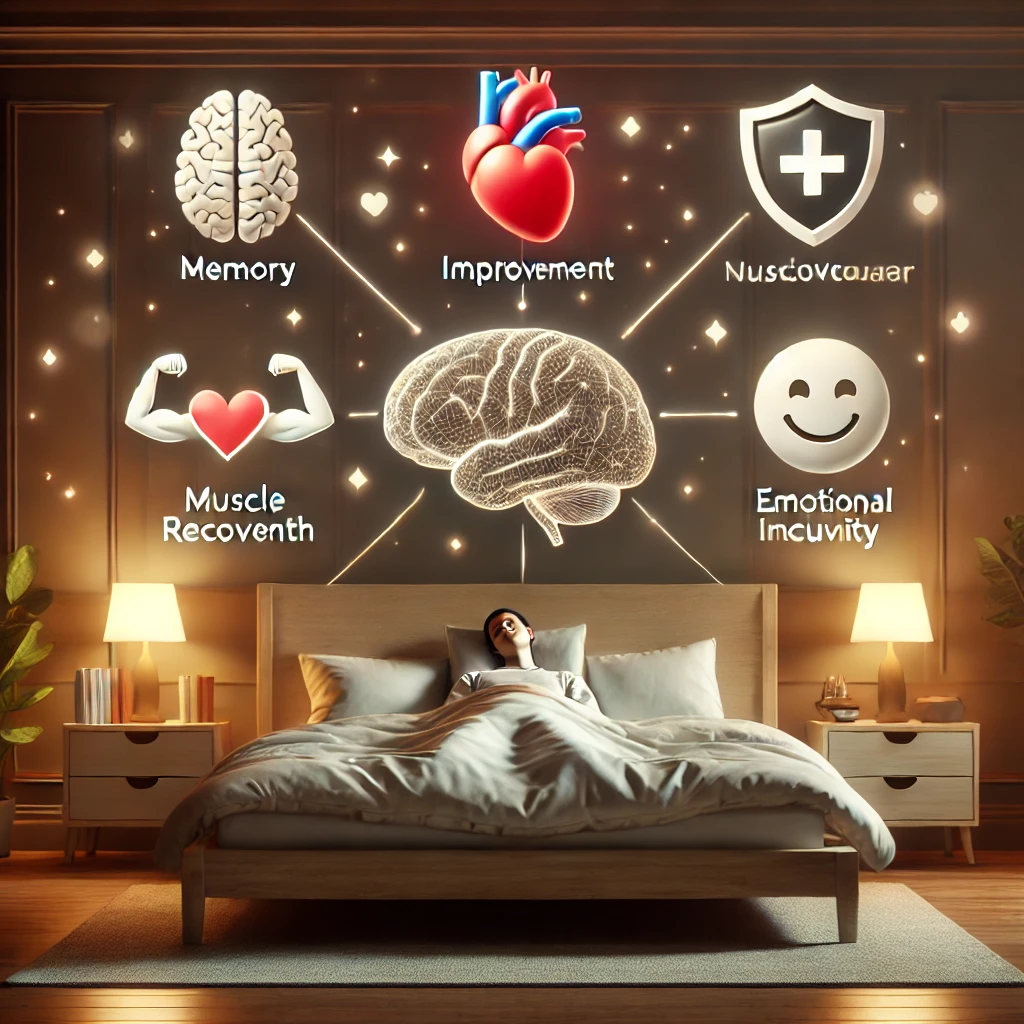The Science of Sleep: How Rest Affects Your Body and Mind

Introduction
Sleep is one of the most fundamental aspects of human health, yet it is often neglected in our fast-paced modern world. Whether due to work demands, social obligations, or digital distractions, many people fail to get the recommended amount of rest. However, science has repeatedly proven that sleep is essential for overall well-being, affecting everything from brain function to immune system strength.
In this article, we will explore the science behind sleep, its impact on physical and mental health, and practical strategies for improving sleep quality.
The Stages of Sleep
Sleep is not a uniform state; it occurs in cycles composed of different stages. The human sleep cycle consists of Non-Rapid Eye Movement (NREM) sleep and Rapid Eye Movement (REM) sleep, each with distinct physiological and neurological characteristics.
1. Non-Rapid Eye Movement (NREM) Sleep
NREM sleep has three stages:
- Stage 1 (Light Sleep): The transition from wakefulness to sleep. The body begins to relax, and brain activity slows. This stage lasts only a few minutes.
- Stage 2 (Deeper Light Sleep): Heart rate and body temperature drop, and the body prepares for deep sleep. This stage accounts for a significant portion of total sleep.
- Stage 3 (Deep Sleep or Slow-Wave Sleep): The most restorative phase, during which the body repairs tissues, builds muscle, and strengthens the immune system.
2. Rapid Eye Movement (REM) Sleep
- This stage is characterized by increased brain activity, vivid dreams, and rapid eye movements.
- REM sleep plays a crucial role in memory consolidation, learning, and emotional regulation.
- It usually begins about 90 minutes after falling asleep and repeats multiple times throughout the night.
How Sleep Affects Your Body
Getting enough high-quality sleep is essential for maintaining physical health. Here are some of the key ways sleep affects the body:
1. Supports Immune Function
- During deep sleep, the body produces cytokines, proteins that help fight infections and inflammation.
- Chronic sleep deprivation weakens the immune system, making individuals more susceptible to illnesses such as colds and flu.
2. Regulates Metabolism and Weight
- Lack of sleep disrupts the balance of hormones leptin (which signals fullness) and ghrelin (which stimulates hunger).
- Poor sleep has been linked to an increased risk of obesity, diabetes, and metabolic disorders.
3. Enhances Heart Health
- Sleep helps regulate blood pressure and reduce inflammation.
- Chronic sleep deprivation increases the risk of heart disease, stroke, and high blood pressure.
4. Improves Physical Recovery and Performance
- During deep sleep, the body releases growth hormones that aid in muscle repair and overall recovery.
- Athletes and active individuals need adequate sleep to optimize strength, endurance, and coordination.
How Sleep Affects Your Mind
Beyond physical health, sleep is critical for cognitive function, mental well-being, and emotional stability.
1. Enhances Memory and Learning
- Sleep helps consolidate information learned during the day, improving memory retention.
- REM sleep, in particular, strengthens neural connections related to problem-solving and creativity.
2. Supports Emotional Regulation
- Poor sleep increases irritability, mood swings, and stress levels.
- Studies show that sleep deprivation is linked to higher rates of anxiety and depression.
3. Boosts Focus and Productivity
- A well-rested brain can process information more efficiently, leading to better decision-making and problem-solving.
- Sleep deprivation impairs cognitive abilities similar to the effects of alcohol intoxication.
4. Reduces Risk of Mental Disorders
- Chronic sleep disturbances have been associated with Alzheimer’s disease, schizophrenia, and bipolar disorder.
- Quality sleep is crucial for long-term mental resilience and neurological health.
Common Sleep Disorders
Many people struggle with getting enough restful sleep due to underlying sleep disorders. Some common ones include:
1. Insomnia
- Difficulty falling or staying asleep, often caused by stress, anxiety, or poor sleep habits.
2. Sleep Apnea
- A condition where breathing repeatedly stops and starts during sleep, leading to poor oxygen flow and frequent awakenings.
3. Restless Leg Syndrome (RLS)
- A neurological disorder that causes an uncontrollable urge to move the legs, often disrupting sleep.
4. Narcolepsy
- A chronic disorder that causes excessive daytime sleepiness and sudden episodes of falling asleep.
How to Improve Sleep Quality
If you struggle with sleep, making small lifestyle adjustments can significantly improve sleep quality. Here are some science-backed tips:
1. Maintain a Consistent Sleep Schedule
- Go to bed and wake up at the same time every day, even on weekends.
- This helps regulate the body’s circadian rhythm (internal clock).
2. Create a Relaxing Bedtime Routine
- Engage in calming activities before bed, such as reading, meditation, or taking a warm bath.
- Avoid stressful tasks or stimulating activities right before sleeping.
3. Optimize Your Sleep Environment
- Keep your bedroom cool, dark, and quiet.
- Invest in a comfortable mattress and pillow to improve sleep posture.
4. Limit Screen Time Before Bed
- Exposure to blue light from phones, tablets, and TVs suppresses melatonin production, making it harder to fall asleep.
- Try using a blue light filter or avoiding screens at least one hour before bedtime.
5. Avoid Stimulants Late in the Day
- Caffeine, nicotine, and alcohol can disrupt sleep quality.
- Instead, opt for herbal teas or warm milk in the evening.
6. Exercise Regularly
- Physical activity helps improve sleep duration and quality.
- However, avoid intense workouts close to bedtime, as they may be stimulating.
7. Manage Stress and Anxiety
- Practice deep breathing, mindfulness, or yoga to calm the mind.
- Writing in a journal can help clear thoughts before bed.
Conclusion
Sleep is not a luxury—it is a necessity for both physical and mental health. By understanding the science behind sleep and making intentional lifestyle choices, you can dramatically improve your well-being, productivity, and overall happiness.
If you struggle with persistent sleep problems, consider seeking medical advice to rule out underlying conditions. Prioritizing sleep today will lead to a healthier, more energized life tomorrow!



